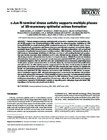| dc.contributor.creator | Stack, Julianne | |
| dc.contributor.creator | McNally, Sara | |
| dc.contributor.creator | McArdle, Emmett | |
| dc.contributor.creator | Napoletano, Silvia | |
| dc.contributor.creator | Gajewska, Malgorzata | |
| dc.contributor.creator | Bergin, Orla | |
| dc.contributor.creator | McCarthy, Sarah | |
| dc.contributor.creator | Whyte, Jacqueline | |
| dc.contributor.creator | Bianchi, Alessandro | |
| dc.contributor.creator | Martin, Finian | |
| dc.date.accessioned | 2019-02-26T15:08:35Z | |
| dc.date.available | 2019-02-26T15:08:35Z | |
| dc.date.issued | 2011 | |
| dc.identifier.citation | McNally, S. et al. (2011) c-Jun N-terminal kinase activity supports multiple phases of 3D-mammary epithelial acinus formation. Int. J. Dev. Biol. 55: 731-744. | en_US |
| dc.identifier.uri | http://hdl.handle.net/10395/2684 | |
| dc.description | c-Jun N-terminal kinase activity supports multiple phases of 3D-mammary epithelial acinus formation. | en_US |
| dc.description.abstract | Primary murine mammary epithelial cells cultured on a laminin-rich-extracellular matrix (ECM) require c-Jun N-terminal kinase (JNK) activity for acinus formation. Inhibition of JNK (using SP600125) or small interfering RNA-mediated knockdown of JNK1 blocked acinus formation, impaired cell polarisation and lumen clearance and allowed sustained extracellular signal-regulated kinase (ERK) phosphorylation, cell proliferation, adhesion-independent cell survival and expression of epithelial-mesenchymal transition markers. ERK inhibition abolished the effects of JNK blockade. Interestingly, inhibition of JNK from the time of cell seeding blocked cell polarisation and lumen clearance; later inhibition (> 6 h) only affected lumen clearance. ERK inhibition effectively protected cell polarisation but less so, lumen clearance. SP600125-treatment similarly affected acinus formation by the ‘normal’ human mammary epithelial MCF10A cell line. Expression of dominant-negative JNK1 in MCF10A cells also undermined acinus formation, generating large ‘multi-acinar spheres’ whose formation is probably driven by excessive luminal cell proliferation and cell survival. As JNK activity must be suppressed from the time of cell seeding to block cell polarisation, we studied the behaviour of MCF10A cells immediately after seeding in laminin rich matrix: we detected engagement of cells with the matrix, early polarisation, movement of cells into clusters and ‘epithelial-cell- like’ behaviour of clustered cells. Inhibition of JNK activity or expression of dominant-negative JNK1 allowed cell engagement to the matrix, but blocked cell polarisation and all subsequent ‘behaviours’. While integrin activation occurred, tyrosine-phosphorylation of paxillin, Fak and Src was significantly damped by JNK inhibition. These results emphasise the multi-phase dependency of the organisation of mammary cells in 3D on JNK activity and suggest a ‘permissive’ support of ECM-integrin ‘outside-in’ signalling and a ‘damping’ of growth-factor ERK signalling as its two key cell physiological effects. | en_US |
| dc.language.iso | eng | en_US |
| dc.publisher | University of the Basque Country Press | en_US |
| dc.relation.ispartofseries | 55; | |
| dc.rights.uri | http://www.ijdb.ehu.es/web/paper/113374sm/c-jun-n-terminal-kinase-activity-supports-multiple-phases-of-3d-mammary-epithelial-acinus-formation | en_US |
| dc.subject | Mammary epithelial cell | en_US |
| dc.subject | Acinus | en_US |
| dc.subject | JNK | en_US |
| dc.subject | ERK | en_US |
| dc.subject | MAP kinase | en_US |
| dc.subject | EMT | en_US |
| dc.title | c-Jun N-terminal kinase activity supports multiple phases of 3D-mammary epithelial acinus formation | en_US |
| dc.type | Article | en_US |
| dc.type.supercollection | all_mic_research | en_US |
| dc.type.supercollection | mic_published_reviewed | en_US |
| dc.description.version | Yes | en_US |
| dc.identifier.doi | 10.1387/ijdb.113374sm | |


